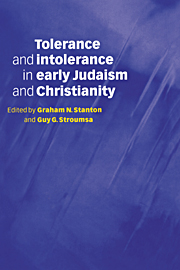Book contents
- Frontmatter
- Contents
- List of contributors
- List of abbreviations
- Introduction
- 1 Intolerance and martyrdom: from Socrates to Rabbi ‘Aqiva
- 2 The other in 1 and 2 Maccabees
- 3 The pursuit of the millennium in early Judaism
- 4 Conservative revolution? The intolerant innovations of Qumran
- 5 Who was considered an apostate in the Jewish Diaspora?
- 6 Why did Paul persecute the church?
- 7 Paul and the limits of tolerance
- 8 Philo's views on paganism
- 9 Coexisting with the enemy: Jews and pagans in the Mishnah
- 10 Tertullian on idolatry and the limits of tolerance
- 11 The threefold Christian anti-Judaism
- 12 The intertextual polemic of the Markan vineyard parable
- 13 Jews and Jewish Christians in the land of Israel at the time of the Bar Kochba war, with special reference to the Apocalypse of Peter
- 14 The Nazoreans: living at the boundary of Judaism and Christianity
- 15 Justin Martyr's Dialogue with Trypho: group boundaries, ‘proselytes’ and ‘God-fearers’
- 16 Accusations of Jewish persecution in early Christian sources, with particular reference to Justin Martyr and the Martyrdom of Polycarp
- 17 Early Christians on synagogue prayer and imprecation
- 18 Messianism, Torah and early Christian tradition
- 19 Jewish and Christian public ethics in the early Roman Empire
- Postscript: the future of intolerance
- General bibliography
- Index
1 - Intolerance and martyrdom: from Socrates to Rabbi ‘Aqiva
Published online by Cambridge University Press: 08 March 2010
- Frontmatter
- Contents
- List of contributors
- List of abbreviations
- Introduction
- 1 Intolerance and martyrdom: from Socrates to Rabbi ‘Aqiva
- 2 The other in 1 and 2 Maccabees
- 3 The pursuit of the millennium in early Judaism
- 4 Conservative revolution? The intolerant innovations of Qumran
- 5 Who was considered an apostate in the Jewish Diaspora?
- 6 Why did Paul persecute the church?
- 7 Paul and the limits of tolerance
- 8 Philo's views on paganism
- 9 Coexisting with the enemy: Jews and pagans in the Mishnah
- 10 Tertullian on idolatry and the limits of tolerance
- 11 The threefold Christian anti-Judaism
- 12 The intertextual polemic of the Markan vineyard parable
- 13 Jews and Jewish Christians in the land of Israel at the time of the Bar Kochba war, with special reference to the Apocalypse of Peter
- 14 The Nazoreans: living at the boundary of Judaism and Christianity
- 15 Justin Martyr's Dialogue with Trypho: group boundaries, ‘proselytes’ and ‘God-fearers’
- 16 Accusations of Jewish persecution in early Christian sources, with particular reference to Justin Martyr and the Martyrdom of Polycarp
- 17 Early Christians on synagogue prayer and imprecation
- 18 Messianism, Torah and early Christian tradition
- 19 Jewish and Christian public ethics in the early Roman Empire
- Postscript: the future of intolerance
- General bibliography
- Index
Summary
The terms used in the title of the present paper point to the moral polarization of philosophical norms and historical inevitabilities. Philosophical principles aim at setting clear moral norms and standards of behaviour. They are expected to guide people in their practical decisions even in the face of adverse historical and personal events. However, as is well known, adhering to one's philosophical convictions often leads to head-on clashes with practical needs and the will to survive. Thus, it turns out that matters are not as simple and as clearly defined in the cases which will be discussed in the present essay as one would wish them to be.
Martyrdom results when attempts at maintaining moral integrity in the face of evil and acts of despotism end in death or personal disaster. Those who are exposed to the martyrological ordeal are likely to become master-models of moral perseverance and standing. Their personal agony is turned into a display of public heroism. If they do not succeed in securing for themselves physical survival, they still survive in the memory of people as models of courage and moral integrity. Martyrs are likely to be viewed as heroes who could look into the face of death without succumbing to selfish desires of physical survival.
Socrates and Rabbi ‘Aqiva are victims whose deaths received the limelight of historical attention. They were executed for different reasons and at different times. Their respective deaths are almost minutely recorded. Their names stand out in history as heroes whose moral standing and steadfastness are of exemplary importance.
- Type
- Chapter
- Information
- Publisher: Cambridge University PressPrint publication year: 1998
- 1
- Cited by



